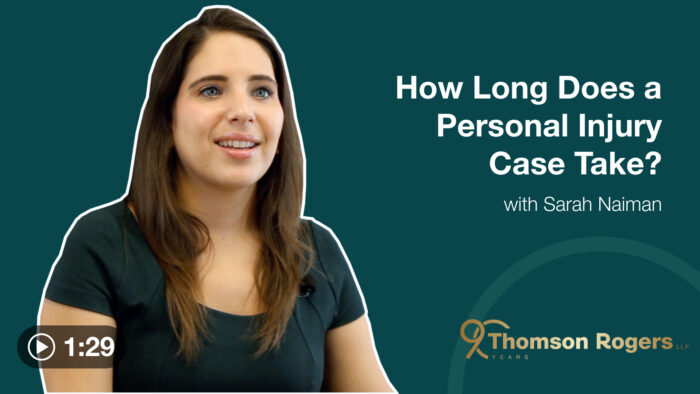CAN AN INSURED BE COMPENSATED WHEN THE PSW PROVIDING THE CARE IS A FAMILY MEMBER?
Author(s): Stacey L. Stevens*
May 5, 2017
On January 27, 2017, the License Appeal Tribunal released M.P. v Certas Home and Auto 2017 CanLII 9810 (ON LAT) denying payment of an attendant care benefit to an insured whose service provider was his wife and a certified PSW.
This is an important decision as it addresses the Tribunal’s interpretation of the definition of incurred found in section 3(7)(e) of the SABS and how it applies in cases where the professional PSW providing the care is also a family member.
Mr. P was injured in a car accident in July 2013. An Assessment of Attendant Care Form 1 determined he required 915 minutes of personal care assistance per week. At the time of the collision, Mrs. P was a certified PSW and working outside of the home providing live-in assistance to seniors 3 days a week. She provided PSW care to her husband during the remaining 4 days a week.
In January 2015, Mrs. P stopped providing PSW services outside the home and increased the number of hours and days she provided care to her husband. Certas denied payment of the attendant care benefit. The denial was upheld by the Tribunal.
As set out in the Statutory Accident Benefits Schedule (SABS), an insured person is entitled to reasonable and necessary expenses incurred as a result of an accident for services provided by an aide or attendant. In order to be entitled to payment of the expense, section 3(7)(e) of the SABS states that an expense is not incurred unless,
the person who provided the goods or services did so in the course of the employment, occupation or profession in which he or she would ordinarily have been engaged but for the accident or sustained an economic loss as a result of providing the goods or services to the insured person.
This reasoning behind this section was previously interpreted by Justice Ray of the Ontario Superior Court of Justice in Henry v. Gore Mutual 2012 ONSC 3687 as follows:
This latest revision was apparently to prevent a member of an insured’s family who was not ordinarily an income earner or working outside the home, from profiting from an attendant care benefit, when they would likely be at home anyway – and would have looked after the injured insured without compensation.
With this in hand, Adjudicator Sewrattan found Mrs. P to be “at the intersection of these 2 classes”; a family member who is professionally qualified to provide the requisite attendant care services.
He went on to find that Mrs. P’s provision of care services to her husband was specifically the type of work the Legislation attempted to disqualify and therefore it did not fit within the category of a professional provider as required.
It may very well be that the particular factual evidence put forward in this matter is enough to argue that the decision is case specific. After a review of the evidence, the Adjudicator was left with many unanswered questions such as did Mrs. P work more than 3 days per week as a PSW before the collision, did these hours decrease as a result of having to provide care to her husband or for other reasons not causally related to the accident such as a lack of available work outside the home or her pre-existing sciatica; was the level of care being provided to Mr. P similar to the type of care she would have been providing to her husband in her free time without the collision without remuneration.
This case may also be a sign of things to come. Insurers are strictly interpreting the SABS and the insured’s right to receive an attendant care benefit. It is possible, with this decision in their back pocket, we will see more and more cases where insurers will only pay an attendant care benefit if it is being provided by an arms-length professional.
Either way, this case demonstrates the need for a strong evidentiary foundation and illustrates the key role rehabilitation team members have in ensuring their clinical notes and records accurately and completely document their clients’ needs.
Read article in PDF format: Accident Benefit Reporter Volume 18, Issue 1
Related Resources for Attendant Care Benefits:
Attendant Care Benefits: The Importance of Documenting Economic Loss
Share this






